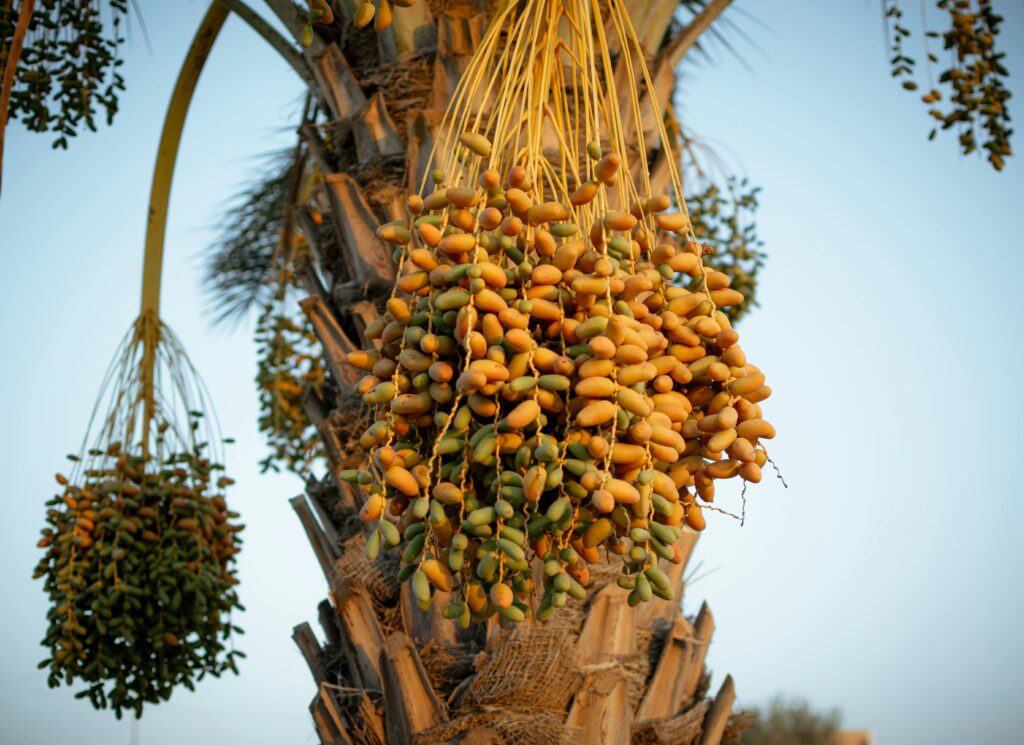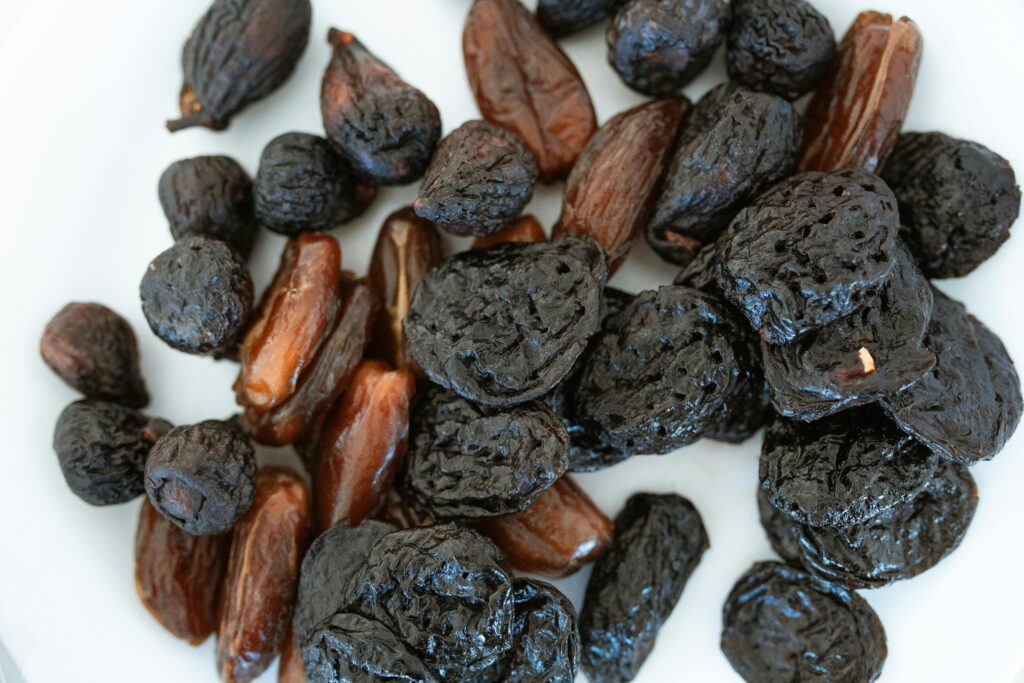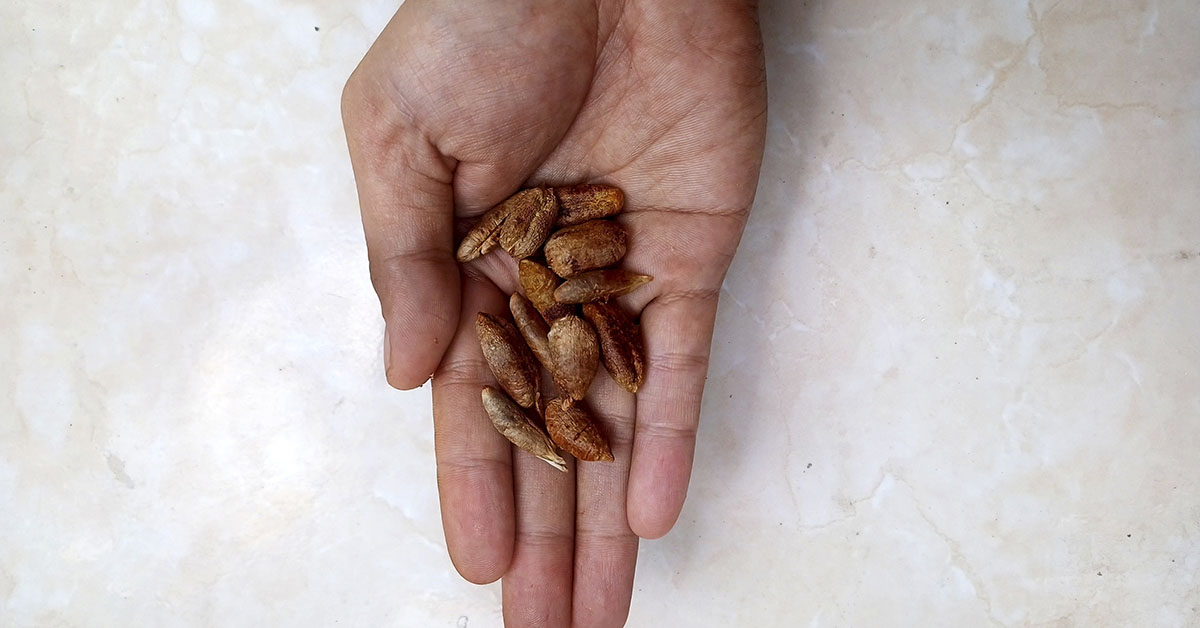People have consumed and enjoyed dates for thousands of years. The date palm’s fruits provide significant health, nutritional, and economic benefits. Most people eat the sticky, sweet, and soft flesh of the date. However, recent research shows that the lesser-exploited date pit could be the source of a caffeine-free alternative.
For centuries, the date seeds (or pits) were roasted and then ground down to make a fine powder. Hot water is then added to a cup with the fine powder for a hot beverage. The result is a dark, aromatic beverage with an earthy flavor. Recently, date seed coffee has seen a resurgence amongst food and health social media circles and consumers searching for caffeine alternatives.
History of Date Seed Coffee

The practice of brewing date seed coffee can be linked to Ancient Middle Eastern cultures who first began centuries ago. Dates were eaten, but traditionally, their hard seeds were discarded. Communities that were located in high date-growing regions discovered the seeds made a warm, roasted drink similar to coffee. Similarly to coffee, it made for a great warming beverage, especially during cold desert nights.
By the late 19th century, rising coffee prices encouraged Middle Eastern households to use roasted date seeds as an alternative. Date seed coffee would be brewed similarly to coffee and retains a similar flavor to coffee, but without caffeine. Eventually, date seed coffee spread into Europe, where it became known as a sustainable, caffeine-free alternative.
Nutritional and Bioactive Compounds

Date seeds have been found to be nutritionally rich. The seeds contain polyphenols such as quercetin, kaempferol, and catechins, all known for powerful antioxidant effects. They also offer insoluble and soluble fibers, protein, healthy fats, and essential minerals. Carotenoids and phenolic acids provide additional bioactivity. These compounds work together to protect cells against oxidative stress and promote overall health, making date seeds a remarkable example of an underappreciated functional food.
Caffeine-Free Energy
Unlike coffee beans, roasted date seeds contain no caffeine. However, even without any caffeine content, many drinkers report elevated and sustained energy without crashes related to excessive caffeine consumption. This effect is likely due to the seeds’ combination of fiber and natural sugars, which release energy gradually. That makes date seed coffee a suitable alternative for people sensitive to caffeine. It also becomes suitable for those with certain health conditions, or anyone who wants to enjoy an afternoon cup without disrupting sleep quality.
Antioxidant and Anti-Inflammatory Benefits
Scientific trials highlight the antioxidant and anti-inflammatory power of date seed extracts. A randomized controlled study in recreational runners demonstrated that daily supplementation with date seed powder increased antioxidant capacity and lowered inflammation markers during high-intensity training. Polyphenols such as catechins neutralize harmful reactive oxygen species that damage cells and tissues. By reducing oxidative stress, date seed coffee may also support immune function and resilience against chronic diseases.
Digestive and Metabolic Support
Traditionally, roasted date seed drinks were used to soothe indigestion and regulate bowel movements. Fiber in the seeds promotes gut health and can feed beneficial gut bacteria. Early studies suggest that date seed consumption may balance blood sugar levels by regulating glucose absorption. This could make date seed coffee a beneficial supplement for people managing diabetes or metabolic syndrome. These effects require more human trial evidence, but the potential is promising.
Read More: 8 Health Benefits of Coffee and Tea
Cardiovascular and Renal Health
Date seed coffee contains minerals like magnesium and potassium that support healthy blood pressure and circulation. Animal studies suggest the seeds may also protect against oxidative kidney damage, showing nephroprotective properties. While human studies remain limited, traditional use indicates that regular consumption may help kidney and heart health by reducing inflammation and supporting fluid balance. By replacing sugary and caffeinated drinks with date seed coffee, consumers may see additional cardiovascular benefits.
Bone and Nutritional Support
Minerals such as calcium, phosphorus, and magnesium make date seeds supportive for bone strength and density. Their high dietary fiber content also prolongs satiety, potentially helping with weight control. For individuals who maintain vegan or gluten-free diets, date seed coffee could be a safe, inclusive option, free from allergens. Unlike instant coffee substitutes that often contain artificial additives, roasted date seed maintains its natural integrity.
How to Make Date Seed Coffee
Making date seed coffee at home is simple and sustainable. First, remove the pits from ripe or dried dates and rinse away any fleshy residue. Let them air-dry naturally for 1 – 2 days, or use low heat in the oven. Then roast the dried seeds at 350°F (180°C) for 30-45 minutes until they turn dark brown and emit a nutty aroma. Once cooled, grind the seeds into a fine powder. Brew 1 to 2 teaspoons of the finely ground powder in hot water using a French press, pot, or tea infuser. For enhanced flavor, add cinnamon, cardamom, or coconut milk. This process minimizes waste and transforms discarded pits into a flavorful, nutrient-rich beverage.
Modern Applications and Sports Performance
Current research explores the functional role of date seed coffee in sports science. A double-blind clinical trial in Iran tested date seed powder on runners performing high-intensity interval training (HIIT). Results suggested improvements in antioxidant capacity, reduced muscle damage, and better recovery times. Other studies show reduced cholesterol, balanced glucose levels, and inflammation control. These findings point to potential applications not only in everyday nutrition but also in athletic performance enhancement naturally.

